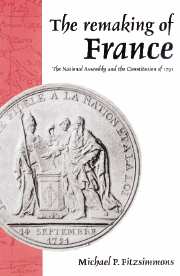5 - The reception of the new ideal of the polity
Published online by Cambridge University Press: 14 October 2009
Summary
It seems that one is taken up with destroying, as much as the remains of prejudices will put up with it, these former divisions of France into dioceses, governments, généralités and bailliages, which are no longer suitable to the representative order and could only maintain seeds of scission and ideas of corps and ordres.
Journal d'Etat et du Citoyen, October 29, 1789As the year 1789 began, and a sense of the nation began to crystallize, France was gripped by the imminent convening of the Estates-General, which was universally viewed as the forum for solving the problems facing the country. The level of enthusiasm was partially sustained, however, by a misapprehension on the part of the clergy and the nobility on the one hand, and the Third Estate on the other. For their part, many within the clergy and nobility, especially the latter, interpreted the December 27, 1788, decision by the Crown to double the representation of the Third Estate as an independent action that did not necessarily amend the traditional method of voting by order. The Third Estate, however, believed that vote by head was implicit in the doubling of its representation, and most elements within it felt a sense of gratitude toward Louis for the action.
The drafting of cahiers in preparation for the opening of the Estates-General particularly encompassed many of the contradictory currents circulating in France during the early months of 1789.
- Type
- Chapter
- Information
- The Remaking of FranceThe National Assembly and the Constitution of 1791, pp. 143 - 175Publisher: Cambridge University PressPrint publication year: 1994



